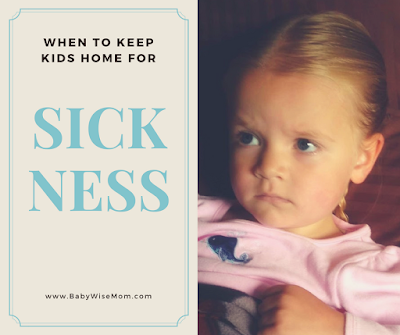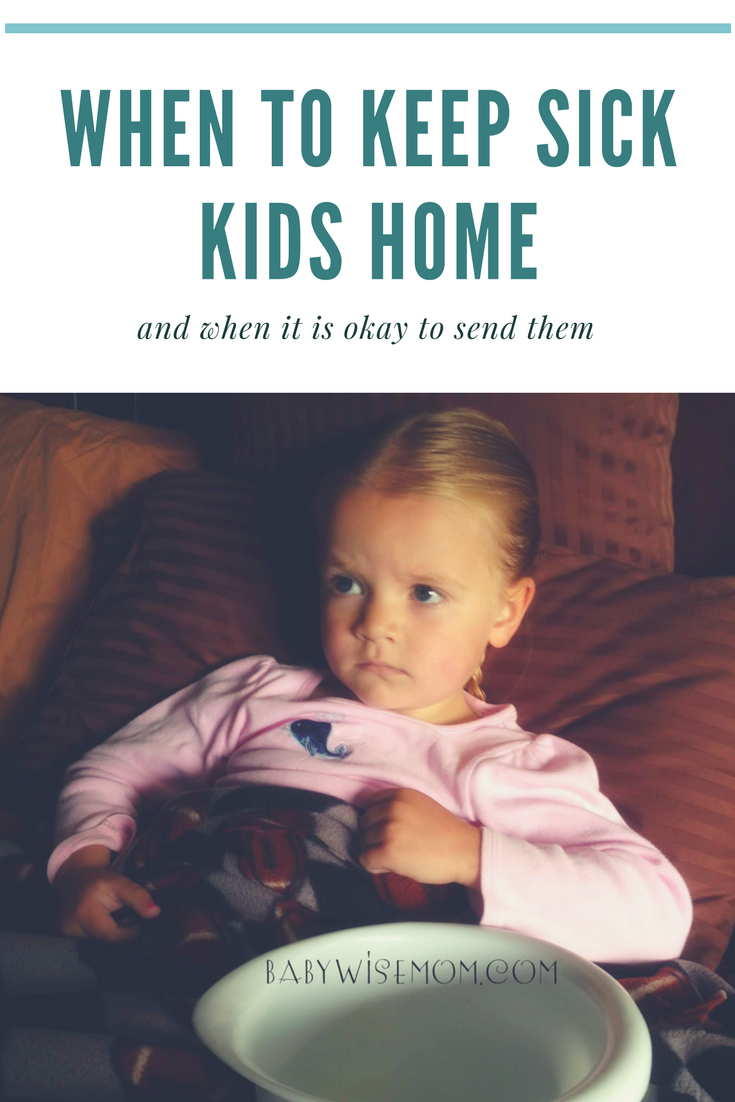
That feeling of dread washes over you. You saw the pictures on Instagram earlier that day. The photos of her little cutie lying limp on the couch because he had been vomiting all morning. “Poor guy!” you had commented, inserting a little sad-faced emoji. Now here he was, just a few hours later, at the park. Germs ahoy!
The dread quickly morphs into frustration if not down-right anger as you think about the next few days and the high likelihood you will be welcoming the same puke-fun into your home. Isn’t it obvious that a child who was puking a couple of hours ago should still be home?
Fortunately, it is obvious for most (though sadly not all) people. There is a whole list of other illnesses, however, that are not so obvious. Parents aren’t always sure when to keep their little one home and when to send them out. I remember having those questions myself as a first time mom. We can’t keep kids home every time they have a stuffy nose, but there are some clear times we should keep kids home and we need to know when those are.
To further complicate the issue, if something really fun is going on at school that day, you can be sure kids will go even with major sickness. Crazy hair day, class party, fun assembly, etc–there will be sick kids present. I have literally never seen so many children puking in the school office as on crazy hair day. So even though some are obvious, the obvious can get pushed to the side in favor of the fun.
Before I get into the details, I must point out that if your child is attending a daycare, preschool, or church nursery, there are most likely some clear guidelines and rules for a sick child from that institutuion. They might be more strict than what I am about to present and they might be more lenient. Be sure you are aware of the policy wherever your child is going. Our school district has sickness guidelines created by the district nurse. If you are not sure what the guidelines are if they even exist, contact the person in charge and ask them what they think you should do. I direct a musical, and each year I get several phone calls from parents asking me what I want them to do with the sick child. I get the symptoms and then either tell them the child is good to come to rehearsal or I tell them to keep the child home. It never hurts to ask and people usually appreciate you checking rather than just spreading germs.
Nauseated/Vomiting: Keep Home
The official guideline for vomit seems to be if the child has vomited two or more times, then the child needs to stay home. They also say if the child has a fever in conjunction with the vomiting, the child needs to stay home. In addition, if the child has been vomiting, the child should stay home until she has been vomit-free for 24 hours.
The reason for the “two times” rule is that sometimes kids can throw up even if they aren’t sick. Sometimes they throw up if they just have nasal drainage and it is upsetting their tummies. However, if there is a fever in addition the puke, home it is.
Let’s be real here. There is no other sound to get you out of bed faster in the middle of the night than that of your child vomiting. Vomit is not fun to clean up. No one likes that going through the family. Laundry for days. Do other parents a solid and keep your vomity child home. Home is where the vomit is. Plus, no one else wants to clean up your child’s vomit. Keep it home.
Diarrhea: Maybe Keep Home, Maybe Send
The close cousin to vomiting is diarrhea. Guidelines here depend on the age of the child and severity of the diarrhea. If it is just loose stools, but the child isn’t living in the bathroom (or within a few feet) and if the child is responsible about hand-washing, then you can usually send the child. Use wisdom here. If you are sending your child to play a soccer game and there won’t be a bathroom within a quarter mile, it just seems like that situation is one for staying home. Don’t send your child into a “most embarrassing moment” situation knowingly.
If your child has severe diarrhea, it is a good idea to keep your child home to watch for signs of dehydration.
If your child is young and can’t make it to the bathroom in time, keep your child home. If your child is still in diapers, they usually like you to keep the child home. If it is so loose that it leaks from the diaper, home it is.
As always, fever along with the diarrhea means you stay home.
Fever: Keep Home
A fever is another reason to stay home. The official temperature for staying home with a fever is 100.4. The reason for this is that a child’s temperature can vary even when perfectly healthy. Make note, however, that this is the temperature without medication. If you dose up on Ibuprofen and get it down from 102 to 100, that doesn’t mean your child is good to go. Another thing for you to pay attention to are other signs I will discuss in depth below. If your child is lethargic and can’t really participate in what is going on, yet only has a fever of 99.9, it is a good idea to keep the child home.
Do not try to mask the fever with medication and send the child. Keep the child home to rest, get better, and contain the sickness.
Lethargy/Not Acting Like Self/Can’t Participate: Keep Home
Even if there are no other symptoms, if your child is extremely tired, isn’t acting like herself, and/or can’t participate in the activities going on, keep the child home. These are signs of sickness. Let your child just rest and get better. You will be able to get your child back to full health sooner and will be less likely to be spreading the sickness around to friends. If your child can’t open her eyes more than halfway, that is a common sign of sickness.
Last year, McKenna had pneumonia. It took us a while to figure out what it was. We visited the doctor more than once while trying to solve the mystery. By the time we pinpointed what was making her sick, she had missed over a week of school. That stresses the heck out of me. I was anxious to get her back there. Her doctor told me he wanted her on antibiotics for 24 hours AND fever free for 24 hours before she went back. He also added that he thought it would be wise to give it a few more days at home at least.
Pneumonia is no joke, and I knew that because I had it the winter before she did. It sucks the life out of you. After two days, she was still not ready. She didn’t have the strength. Her teacher was AMAZING and had started Facetiming with her to have reading time and math time so she could still be getting those fundamentals at home, yet still be able to rest, rest, rest. Even though she was past contagious, she needed to be home because she couldn’t fully participate in school. It would have taken her body longer to fight it off all the way.
I know that basketball game, class party, or birthday party seems like a big deal right now. My kids have missed all of those and more. Brayden even missed the last few days of school in first grade–those are the best days of the year! It seems like the world to your young one. I promise they will get over it, and that in the grand scheme of life, it will be okay.

Difficulty Breathing: Keep Home
I have a good friend who works for 911 Dispatch. She told me last week that breathing issues is something parents should never mess around with. If your child’s breathing is labored, keep your child home. You need to watch your child closely. If your child seems to be having a hard time, don’t hesitate to head right to the ER. Sadly, children frequently have fatalities because of breathing problems. Keep your child’s fate in your hands under your eyes and don’t hesitate to seek medical attention.
Cough: Send or Keep Home
A mild cough accompanying a cold is usually okay. A severe cough is something to stay home for to be sure you don’t have something contagious like bronchitis or croup going on. Sometimes a cough is simply brought on by asthma, allergies, or even bad reflux. Use your best judgment.
Eyes Stuck Shut or Oozing: Keep Home
Yep. Stay home for that one.
On Antibiotics: Ask Doctor
If you have been to the doctor for a sickness and are leaving with antibiotics, always ask the doctor when your child can go back into society. Most of the time, the answer is 24 hours after starting the medication. Your child’s doctor might have further recommendations based on the sickness and your child getting better, like our doctor did for McKenna. Like Daniel Tiger says. When you’re sick, rest is best.
Eyes Red or Watery: Send
This is usually an indication of allergies or at most a cold. Send your child for this one (assuming, of course, you don’t have other symptoms on the list of “Stay Home”).
Cold/Stuffy Nose: Send
A cold is a sickness you still send your child so long as the other “keep home” symptoms are not present. One thing to keep in mind, however, is common courtesy and what your child will be doing. If, for example, your child is at the beginning of a cold when the snot is just free-flowing, only two years old and therefore unable to blow her nose or stop the flow at all, and you are supposed to be at a friend’s house where there is a newborn baby, reconsider attending. At the very least, I wold contact the mom and see what she thinks, making it clear you are happy to reschedule if she feels uncomfortable with the visit. What looks like a cold to some children and adults turns into RSV for infants. So colds are okay in general, but always consider your company.
Earache: Send
Ear infections aren’t contagious. So long as your child doesn’t have any other of the “Keep Home” things going on (including the “can’t participate” one listed above), you are good to send your child.
Sore Throat (no fever or upset tummy): Send
If your child has a sore throat and no fever or upset tummy, you can send. Sometimes it is just a runny nose draining that makes it sore. What you want to be cautious of is sometime like strep throat. If no fever and no upset tummy, you should be good to go.
Real Life Example
This past December, Brayden had a performance at the school first thing in the morning. We all went and he did his thing. Immediately after, he came to me and said he didn’t feel so good. This is the sneaky and hard thing about a lot of sickness, it seems. They often hit later in the morning. You wake up feeling just fine and then WHAM! 10 AM and you are not-so-hot. I asked him if he thought he was sick. He wasn’t sure. He was pale. I did my scientific mom-kiss-on-the-forehead to see if he had a fever and he felt fine. His teacher walked up to us and I told her he was wondering if he was sick.
She was great. She told him if he didn’t feel good, to go on home. She told him what he would miss that day and offered to grab his stuff for him. So we took him home. He ended up getting a low-grade fever that stayed below 100. He rested all of that day. The next day, he was totally good to go.
Something important to note is that if you respect the sickness from the beginning and just rest, your body can usually fight it much, much faster and you are not as sick as long.
Another take-away from this for all of us is to be like Brayden’s teacher (and McKenna’s teacher in the story I shared above). Sickness is what it is. Accept it. Encourage the person to get better. Make it easy for them to go get the rest they need. This way, sickness doesn’t have to permeate through us all so long.
Conclusion
Sickness is a fact of life. People will inadvertently spread it. We are often contagious before we even realize it. However, when we can clearly see something is wrong, we can do our part to help prevent the germs from being spread even more. We can also do a lot for our child by just getting the rest in on day one and letting the little body fight and heal as much as possible. It is sad to miss the fun, but I promise in five years, your four year old will have no memory of missing that church party he wanted to attend so desperately. Life will go on and all will be well.
Related Posts/Blog Lables:

- Comforting a Sick Toddler/Baby
- Dealing With Disruptions To Your Routine
- In Action: Comforting Sick Children
- Preventing Illness {Guest Post}
Sources:
